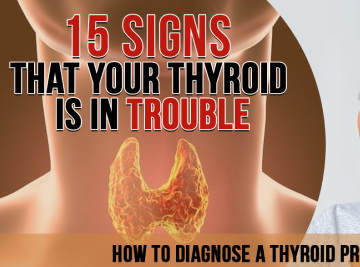Have you noticed some changes in your body lately? Is your skin becoming dry, and your hair seems brittle? Or perhaps, are you experiencing mood swings, constipation, sudden weight loss, or weight gain? These abnormal occurrences in the body should be taken seriously, as they signal that something wrong is happening in your body functions.
One of your body organs has a critical function, for it serves as a regulator, and this is the thyroid gland. This gland controls the production of thyroid hormones to ensure the normal functioning of the body organs and systems. In this article, you will learn fifteen signs that will tell you your thyroid is not at its best because it is in trouble.
The Thyroid Gland And How It Works
Are you wondering what your thyroid looks like? It looks like a butterfly. It is a large ductless gland found at the base of your neck.
How does this gland work? The thyroid gland controls almost everything, and it acts as a thermostat. It secretes thyroid hormones responsible for regulating energy, metabolism, temperature, and even your growth and development. More so, this gland uses iodine in the food that you eat to produce thyroxine (T4) and triiodothyronine (T3) hormones. The chemical reactions on your thyroid rely mostly on minerals that you take, like selenium and iodine.
Did you know that the only cell that absorbs iodine are the thyroid cells? The thyroid cells function by combining the iodine and amino acid tyrosine to make T3 and T4. These hormones are then released into the bloodstream and transported throughout the body to control metabolism and many other body functions.
The hypothalamus and the pituitary gland, which is in your brain, control your thyroid. The hypothalamus secretes a thyrotropin-releasing hormone, also known as TRH, which stimulates the pituitary gland to produce a thyroid-stimulating hormone (TSH).
Three Types Of Thyroid Problems
When your thyroid is producing too much or too little thyroid hormone, this means that something is wrong. Thyroid problems can be classified into three medical terms, and these are:
Hyperthyroidism
Typically, the thyroid gland releases the right amount of hormones to perform various functions in your body. Still, sometimes it produces too much thyroxine, which is the reason why you have hyperthyroidism. It can speed up many things in your body, like sweating a lot, feeling moody and nervous, rapid weight loss, and a fast heartbeat.
Hypothyroidism
Hypothyroidism occurs when your thyroid gland does not produce enough thyroid hormone. This would be an underactive thyroid. Symptoms of an underactive thyroid include tiredness, constipation, intolerance to cold, and weight gain. Low iodine content in your diet can be the cause of hypothyroidism.
Autoimmune Thyroid Disease
This type of thyroid problem is also known as Hashimoto’s thyroiditis. Although some doctors don’t fully understand the cause of this, it is said to be coming from your genes, a virus, or something else. In this case, your immune system attacks its own body tissues, specifically the thyroid. Therefore, it cannot produce enough hormones needed by the body.
Knowing the three types of thyroid problems, here are the 15 signs that will warn you that your thyroid is in trouble.
- Your Energy Is Down.
You had a full night’s sleep, yet you feel exhausted when you wake up. Or you may suddenly have a loss of energy in the middle of the day, or you tire out very quickly and have a loss of energy. These scenarios can strongly be linked to an issue with your thyroid.
- You Have Trouble Sleeping.
Your thyroid can also affect your sleep. When you want to sleep a lot, it means your thyroid is low. However, if you feel like you have a never-ending battery, and it seems like you are at the tip of your adrenaline, your thyroid is probably hyperactive.

- Your Weight Is A Problem.
Your inability to lose or gain weight can also be linked to your thyroid. You work hard in the gym, doing exercise after exercise, and you are watching your diet, but nothing seems to work. You then ask yourself, “am I doing it right?” You are doing it right, but you are not burning calories because your thyroid is malfunctioning. However, on the other hand, your thyroid can also be blamed when you have sudden weight loss.
- There Is A Lump In Your Throat
Have you tried checking your throat? You can do a physical check by looking into a mirror and while drinking water, touch, and check for a lump. If you feel a lump in your throat, please make an appointment to see your doctor.
- You Have Mood Swings
Are you going through mood swings such as anxiety or depression? Your thyroid could be the culprit. Being cranky, agitated, or nervous can be signs of the overproduction of hormones in your thyroid. Feeling depressed or down for no reason can indicate a low production of your thyroid.
- You Experience Constipation
Several reasons can be attributed to constipation, but hypothyroidism can also affect digestion and elimination of stool that can result in constipation. When this happens, the thyroid slows down the many-body systems, which can make you experience constipation.

- Your Appetite Is Either High or Low
A sudden increase in your appetite can signal hyperthyroidism because it can make you feel hungry all the time. In this case, the thyroid is overactive, and it needs tons of fuel to use up even when you are resting. When the body burns calories at a high-speed rate, your body wants to regain it more.
On the other hand, when your metabolism slows down due to a low functioning thyroid, your brain will tell you that you don’t need much fuel to burn, causing a low appetite. In some cases, low thyroid can make you crave sugar to overcome the fatigue that you are feeling.
- You Have Trouble Concentrating
Surely, aging and sleep deprivation can affect your cognitive functioning, but when your thyroid is in trouble, it can also be the blame. An issue with your thyroid hormone can cause difficulty in concentration and your memory.
- You Have High Cholesterol
The fat-like substance found in your blood is called cholesterol, and there is good and bad cholesterol. Your body needs this to build healthy cells. It helps your body to produce vitamin D and the hormones testosterone, estrogen, and cortisol. When your thyroid is in trouble, fats in your body are not burning up, leading to a high cholesterol level.

- You Have Fertility Problems, Irregular Periods, Or A Low Sex Drive
Your thyroid is responsible for controlling your menstrual cycles and fertility. You may have been trying to get pregnant, yet hormonal problems such as fertility problems, irregular periods, low sex drive, and even miscarriages block the way.
These problems may be linked to a thyroid problem.
- You Experience Joint And Muscle Pain
The joints hold the bones together and support your movement. While the soft tissues in your body are responsible for your muscles. Whenever you stub your toe, you can generally shake it off, and pain subsides. However, when you feel sudden numbness or unexplained pain in your joints and muscles, this may be due to a low functioning thyroid. If you’re experiencing this, you should have a check-up with your doctor.
- You Either Feel Too Hot Or Too Cold.
As mentioned previously, your thyroid is your body’s thermostat. When the thyroid becomes overactive, you sweat easily and feel warm. On the other hand, having chills or feeling too cold means your system is under-functioning. Whether you feel too hot or too cold, it’s best to consult with your doctor about a thyroid test.
- You Have High Blood Pressure.
High blood pressure can also be associated with a thyroid problem. The culprit can be either hypothyroidism or hyperthyroidism. Studies suggest that people with hypothyroidism are two to three times more at risk of developing hypertension. However, an underactive thyroid can affect the flexibility wall of blood vessels and the pumping strength of the heart, resulting in high blood pressure.
- You Have Dry Skin
Dry skin can also indicate trouble with your thyroid gland. The appearance and texture of your skin can change and become very dry due to a slowed metabolism.
- You Have Brittle Hair
Your thyroid may be in trouble if you are experiencing dry & brittle hair. Hair follicles are in the “resting” stage when your thyroid hormones disrupt your hair growth cycle. In the worst case, it can also cause hair loss even on your eyebrows.
Possible Preventive Measures And Solutions
Thyroid problems are not life-threatening, but you need to take measures on improving the functions of this gland. Here are some tips you can do to keep your thyroid healthy.
- Be conscious of eliminating stress in your life.
- Have a healthy diet to recover and restore your thyroid functions naturally.
- Eat food that contains Iodine, Iron, Vitamin D, and B Vitamins. You may check out the table below for the foods that fall in each vitamin or mineral.

- The US recommended daily intake of iodine is 150 micrograms (mcg) per day for most adults
- Only take a sufficient amount of iodine needed by your body.
- Sleep at least 8 to 10 hours.
- If you have one or more signs mentioned above, please see your doctor.
How To Diagnose A Thyroid Problem?
The ones mentioned above are some of the signs to spot if you are having trouble with your thyroid. Upon identifying yourself in some or most of the 15 signs, better have a diagnostic procedure. Most of the time, thyroid problems are misdiagnosed. They are mostly associated with other health problems.
Here are some of the medical procedures for diagnosis:
- Thyroid and Neck Examination
In this examination, your doctor will let you hold a glass of water and be seated with your head slightly tilted. Then, you will be asked to drink and swallow. The doctor will look for abnormal enlargement, asymmetry, contour, or masses in your neck.
- Hormones Check
A blood test is used to check your hormones. The definitive one is the Thyroid-stimulating Hormone(TSH) test, while others include T4, free T4 index, total T4, and Thyroxine test.
- Iodine Thyroid Scan
In this test, a radioactive isotope will be given to you. You may receive it by injection, liquid, or a pill. You will be asked to lie on a table with your head stretched backward, and a special camera will show images of the single nodule or the whole thyroid gland on a computer screen to determine abnormalities. It also shows how iodine is processed within your thyroid.
- Thyroid Ultrasound
High-frequency sound waves are used in this test to produce images of the thyroid. This test is much safer because there’s no exposure to radiation. Ultrasound is better in detecting thyroid nodules.
- Radioiodine Uptake Test
In this test, you will take an oral dose of radioactive iodine to see how much will be collected in your thyroid gland. A high uptake of radioiodine is an indication that your thyroid is producing too much thyroxine.
Low uptake of radioiodine indicates a leak in the thyroxine stored in your bloodstream.
- Physical Examination
A medical diagnosis for thyroid problems also includes a physical examination such as heart rate, evidence of dry skin, slower reflexes, and swelling around the eyes and legs. Having a regular physical examination is advised to ensure that your body is in normal condition.

Final Thoughts
Your health must always be your number one priority. Failure to recognize and acknowledge abnormal body functions can lead to more severe health problems and a poor quality of life.
Don’t take your health for granted.
If you feel and notice anything unusual within your body, it is better to consult with your doctor at once.
These 15 signs are of great help to you in checking out if your thyroid is healthy or is experiencing some trouble,
In addition, it is great to have a medical diagnosis to ensure the status of your thyroid to make sure you are ahead of any health issues.
Taking care of your thyroid is like taking care of your whole body.




